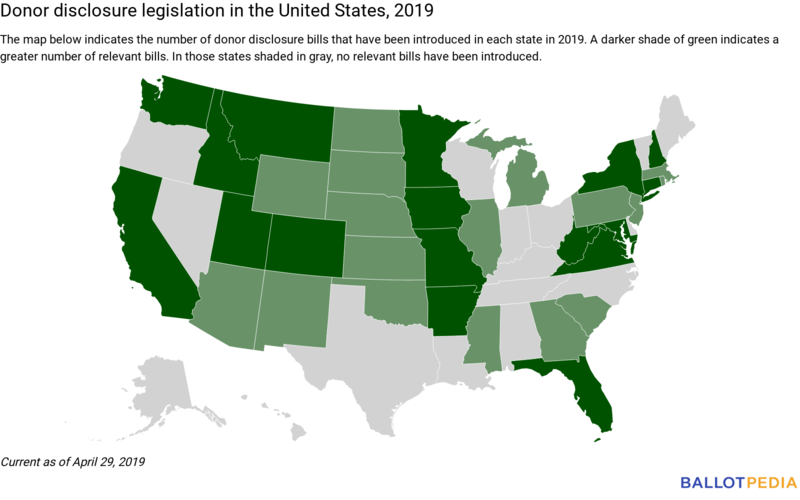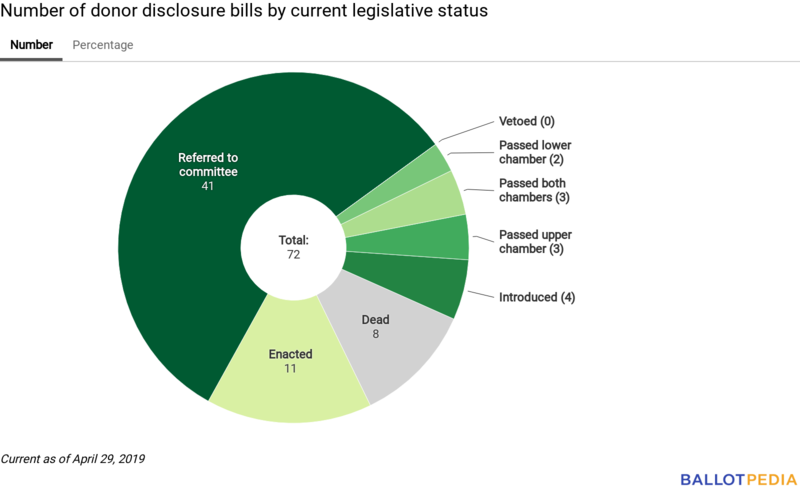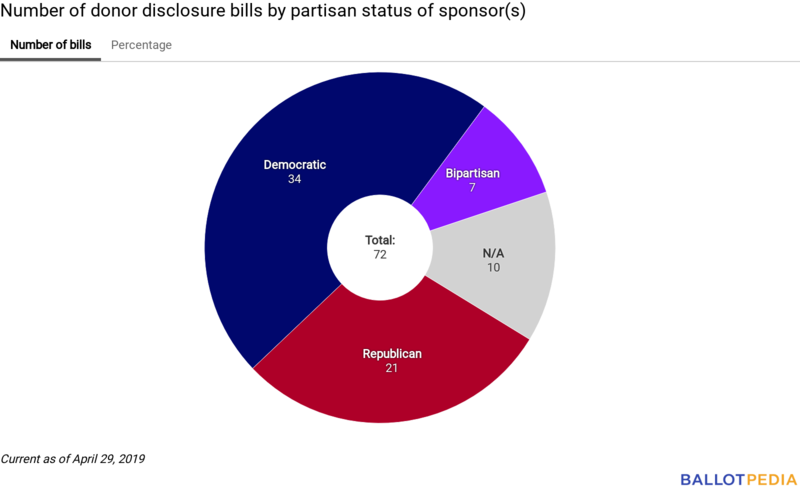The Disclosure Digest: April 29, 2019

Explore the laws governing nonprofit donor disclosure with Ballotpedia. Each weekly edition of The Disclosure Digest will highlight noteworthy legislation, pending litigation, and major activities by advocacy groups.
Nonprofit organizations do not distribute surplus revenues as profits or dividends to shareholders. Instead, nonprofits use revenues for self-preservation or expansion. Tax-exempt nonprofits are regulated under Section 501 of the Internal Revenue Code. States may subject nonprofits to additional regulations beyond those imposed by the federal government. Under federal law, nonprofits are generally not required to disclose to the public information about their donors. State laws, however, may require such disclosure. Some say expanded donor disclosure provisions minimize the potential for fraud and establish public accountability. Meanwhile, others say that disclosing information about donors violates privacy rights and can inhibit charitable activity.
This week, we shine a spotlight on Washington state, where the legislature recently approved legislation expanding disclosure requirements for contributions to PACs.
State spotlight: Washington legislature approves bill expanding disclosure requirements for contributions to political action committees
On April 22, 2019, the Washington House of Representatives voted unanimously to approve HB1379. Current law requires political action committees (PACs) to disclose their top five donors on political advertisements. Under HB1379, a PAC producing a political advertisement would also be required to disclose the top three contributors to any PAC ranking as a top-five donor. On April 15, 2019, the Washington State Senate voted 27-21 to approve the measure. All 27 'yea' votes were cast by Democrats, and all 'nay' votes but one were cast by Republicans.
- What comes next? Having cleared both chambers of the state Legislature, the bill is awaiting action from Governor Jay Inslee (D).
- What are the responses? According to a staff summary of public testimony at a March 29 Senate committee hearing, the following statements were made in favor of, and in opposition to, HB1379:
- In favor: "When votes can be influenced by hidden special interests, citizens get discouraged and stop participating. We have seen a huge increase in organizations participating in campaigns with no transparency. The people of Washington deserve to know who is funding campaigns."
- In opposition: "This is a better, more practical and functional application of the concept than the Senate bill, but we have concerns about donor intent. Donors may inadvertently be downstream contributors to advertisements they do not influence or know about."
What we're reading
- Arizona Public Media, "Clean Elections Commissioner Concerned about Dark Money in Arizona," April 26, 2019
- CT Post, "Political ad reporting a ‘hidden tax’ on news organizations," April 26, 2019
- Brechner Center for Freedom of Information, "Open-government advocates unite to support transparency in university foundation finances," April 22, 2019
The big picture
Number of relevant bills by state: We're currently tracking 72 pieces of legislation dealing with donor disclosure. On the map below, a darker shade of green indicates a greater number of relevant bills. Click here for a complete list of all the bills we're tracking.
Number of relevant bills by current legislative status
Number of relevant bills by partisan status of sponsor(s)
Recent legislative actions
Below is a complete list of legislative actions taken on relevant bills in the past week. Bills are listed in alphabetical order, first by state then by bill number. Know of any legislation we're missing? Please email us so we can include it on our tracking list.
- New Hampshire SB105: This bill would establish disclosure requirements for certain contributions made to inaugural committees.
- House Election Law Committee hearing April 23.
- Washington HB1379: This bill would amend a state law requiring that entities producing political advertisements publicly disclose their top five donors.
- Delivered to governor April 26.
See also
| |||||||






